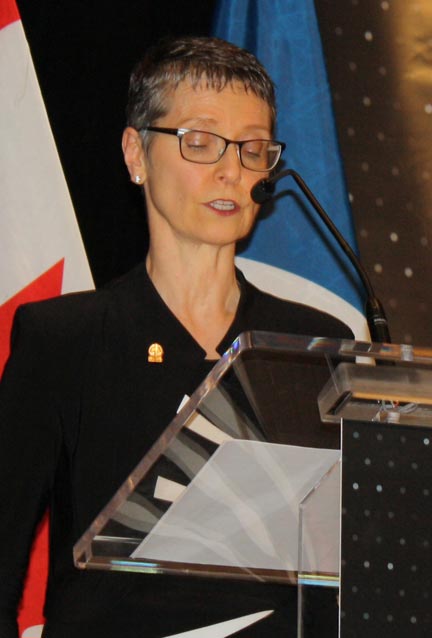
CALGARY — As the Canadian Bar Association conference got underway this morning, Chief Justice Beverley McLachlin opened with a keynote speech emphasizing the need to balance the pressing need to change the delivery of legal services with lawyers’ professional obligations.
 “Flexibility and innovation, yes. Abandonment of core professional values, never,” said McLachlin in a speech aimed at addressing the challenges facing the legal profession due to rapidly changing technology and client demands for lower costs.
“Flexibility and innovation, yes. Abandonment of core professional values, never,” said McLachlin in a speech aimed at addressing the challenges facing the legal profession due to rapidly changing technology and client demands for lower costs.
While McLachlin emphasized the need to protect core values, she made clear that resisting change isn’t an option.
“We’re part of it, and there’s no escape,” she said, referring to the technological changes making legal information available in other ways and players such as LegalZoom that are growing rapidly.
In her speech, McLachlin focused on the major challenges facing the legal profession while outlining what she sees as new opportunities that provide some optimism for different ways of doing business, particularly for “nimble, tech-savvy lawyers.”
“Legal systems everywhere are experience an access-to-justice crisis and are responding in different ways,” she said, suggesting Canada has done a good job of trying to address the issues by looking for ways to make legal services more accessible.
Efficiency and affordability, she added, will be key.
“The time-honoured legal phrase ‘with due deliberation’ has no place in the new world in which we live and practise,” she said.
She went on to suggest lawyers will also have to consider a loosening of their dominance over the delivery of legal services to make room for other, cheaper offerings.
“In the age of the Internet, people are questioning why they, the consumers of legal product, should be forced to go to expensive lawyers working in expensive office buildings located in expensive urban centres. Why, they ask, should a client retain lawyers, when integrated professional firms can deliver accounting, financial and legal advice?” she said.
“The old assumptions are being questioned,” she added, noting the question isn’t whether there will be liberalization but how it will happen.
“We must not close our mind to the changes that are being increasingly forced on us.”
McLachlin spoke in Calgary as the CBA conference got underway with a significant focus on how lawyers with a focus on innovation and “building a better lawyer.” Sessions at the conference will cover topics such as innovation and the future of law firms as well as the role of things like bitcoin, Google Glass, and three-dimensional printing in the practice of law.
In her speech this morning, outgoing CBA president Michele Hollins touted the CBA’s role in helping lawyers adapt to the changes.
“It’s a great time to be talking about innovation in the legal profession but it’s an even better time to be leading that conversation,” she said.
The comments come as the CBA itself faces significant change as it considers its Rethink process aimed at reinvigorating the organization to make it more relevant to lawyers. It was a theme incoming president Janet Fuhrer emphasized in her remarks to the CBA council yesterday.
“Every aspect of what we do is on the table and under the microscope,” said Fuhrer, who called on lawyers to embrace the CBA’s Legal Futures, Equal Justice, and Rethink efforts underway. “If we are unable to revise ourselves, then we risk irrelevance.”
Despite those challenges, Hollins noted the CBA has continued to play a significant role.
“We have tackled issues in every corner of the law,” she said, citing the association’s significant submissions on Bill C-51. And with a federal election underway, she said, it would be playing a role in trying to raise the access-to-justice issues it has been focusing on during the campaign.
To that end, she announced a new Twitter hashtag, #whataboutalex, aimed at discussing Canadians’ experiences in the justice system and the challenges they face.